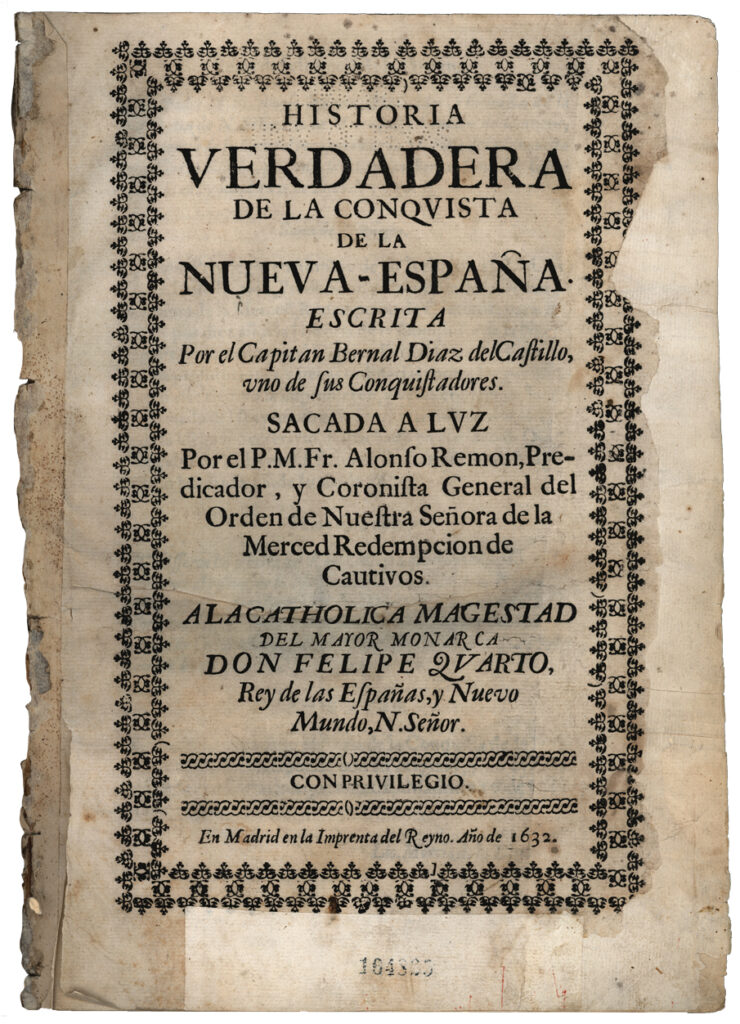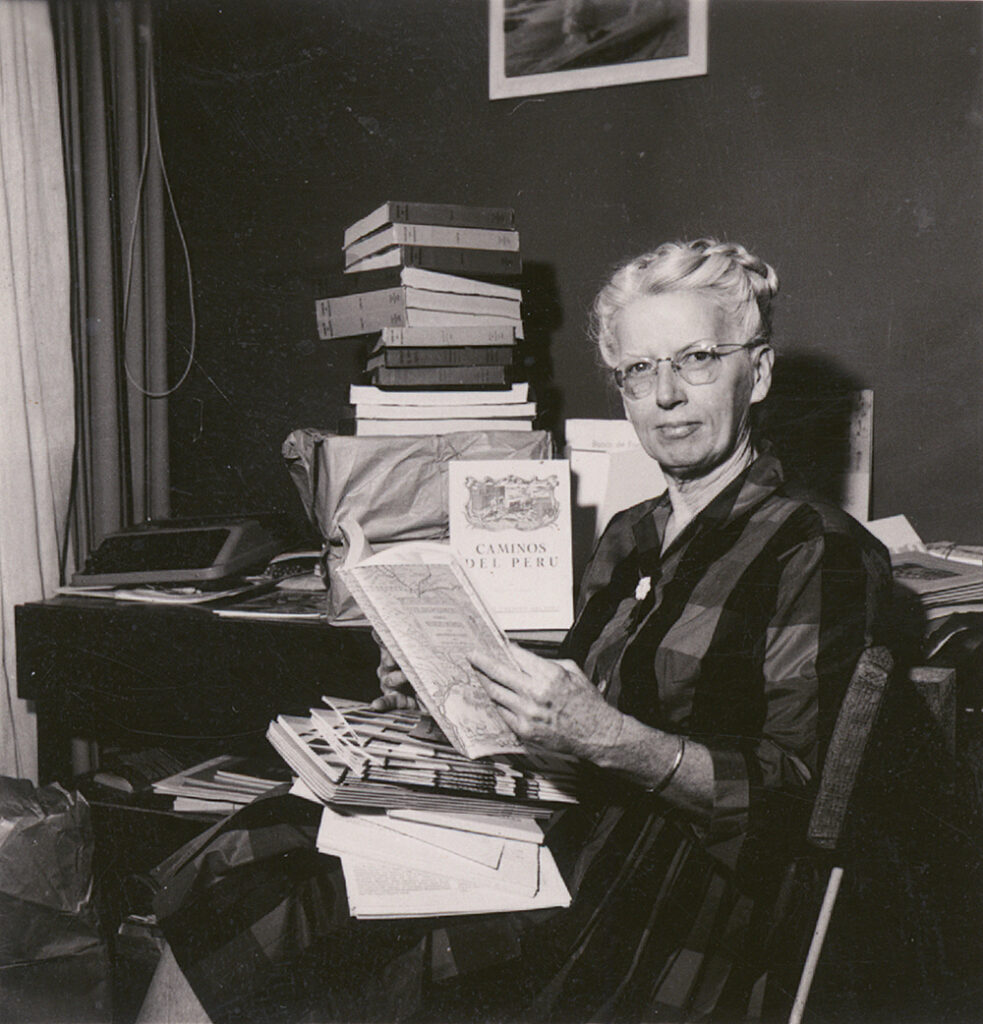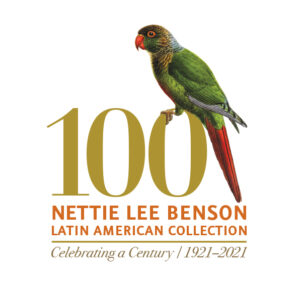IT’S DECEMBER 1, 1920, in Mexico City. After witnessing the inauguration of President Álvaro Obregón, University of Texas Regent H.J. Lutcher Stark and Chair of Latin American History Charles Wilson Hackett stumble upon an amazing find as they walk down Madero Street. Historian and head librarian Nettie Lee Benson narrates the moment: “Hackett, spying a copy of the first edition of Bernal Díaz del Castillo’s True History of the Conquest of New Spain in the window of a bookstore, excitedly remarked: ‘That is a book that should be in the library of the University of Texas,’ to which Mr. Stark responded: ‘Let’s purchase it.’”1

The purchase of this book, written in 1576 by a Spanish conquistador and colonist, and printed in Madrid in 1632, would lead to the eventual acquisition, in Mexico, of the Latin American library’s seminal collection—the private library of the late senator, historian, and bibliophile Genaro García, purchased by the University of Texas in 1921.
The transport of the monumental García collection from Mexico City to Austin, Texas, was thrilling in its own right. Comprised of 11,000 volumes, 15,000 pamphlets, 200,000 pages of manuscripts, numerous files of newspapers, and more, the collection weighed in at 17 tons. According to Benson’s account, librarian E.W. Winkler and a member of the García family sat guard on wagons containing the materials for a week before the collection was loaded on a freight car bound for Austin. Winkler and the late García’s son then rode in the train’s caboose all the way to Austin.
Although Mexico had ratified its constitution in 1917, fighting associated with the revolution of 1910 continued for many years. (Obregón himself would be assassinated in 1928 following a re-election bid.) It is within this context that some Mexican scholars and bibliophiles sought to protect items of cultural importance outside of the country, contributing to the now-notable Latin American collection. Among the most significant of these was the rich manuscript and book collection of Mexican bibliographer and historian Joaquín García Icazbalceta, which arrived in 1937 and contains the Relaciones Geográficas, rare and exquisite hand-painted sixteenth-century maps and associated documents.
Many of the Latin American library’s prized materials, however, were rescued from destruction by quick-thinking people: In 1967, former UT student Louise Wheless recognized the signature of Mexican revolutionary Pancho Villa on a large mass of papers that were about to be burned in Torreón, Mexico. In 1973, William S. Callaghan, a doctoral candidate in Brazil’s economic history, rescued the complete archives of the St. John d’El Rey Mining Company of Brazil from the sub-basement of a London warehouse. Both of these archival collections, and so many more like them, ended up as part of the Benson.

Stories of the collection’s early days evoke the sense of being in the right place at the right time. This is also true of the scholars and librarians who guided the library during its growth.
Mexican historian, archivist, and educator Dr. Carlos E. Castañeda was invited to UT Austin, his alma mater, in 1927 to take stewardship of the García collection. His contributions to the foundational years of the library, and to scholarship on the early history of Texas, are essential chapters in the intellectual history of the university and in the story of the library. An advocate of equal treatment for Mexican Americans and other ethnic minorities, Castañeda left in 1943 for a position at the Fair Employment Practices Commission. In 1975, the Board of Regents unanimously voted to name the Perry-Castañeda Library in his honor.
Dr. Nettie Lee Benson would serve as director of the Latin American library for 33 years, retiring in 1975. As a professor of history at the university, she was both admired and feared for her scholarly rigor. It is her storied tenure as a librarian with vision and tenacity that led to the transformation of the collection that bears her name.

“Benson transformed the collection into an instrument capable of supporting research and teaching at the University of Texas,” writes former head librarian David Block. “She did so with a mix of innovation, collaboration, and chutzpah.”2
Passion. Innovation. Determination. Vision. These are just some of the qualities that have propelled the Benson Latin American Collection on its century-long journey to the present.
The Benson is now one of the most important collections of Latin American and U.S. Latina/o/x materials on the planet, visited by scholars and students from far and wide. The collection continues to grow, but more importantly, the Benson has changed and evolved with the times in exciting and significant ways.
Through its partnership with the Teresa Long Institute of Latin American Studies (LLILAS) and its interdisciplinary faculty, the Benson has pursued collaborations with organizations throughout Latin America, placing emphasis on the preservation of vital archival collections in their place of origin, as well as the sharing of technology and training for digitization of these materials. This pioneering work in digital scholarship has ensured that more and more resources will be openly available to anyone with access to a computer, while partnerships with sister organizations in the Americas have strengthened ties to Latin America in a horizontal way.

The vision of this library—a spark ignited on a street in Mexico City some 100 years ago—has been realized because of the passion for knowledge, and because of access to the resources necessary to support that passion.
Today, we celebrate the realization of this vision as we mark 100 years of learning, of the power of the words, images, and ideas embodied in this unique collection, we ask you to celebrate with us, and give generously to ensure its existence far into the future.
Visit Benson100.org or contact Hannah Roberts at h.roberts@austin.utexas.edu to learn how you can support the Benson Latin American Collection.
Notes
1. Discovery: Research and Scholarship at The University of Texas at Austin, Centennial Issue, 1983.
2. A Library for the Americas (University of Texas Press, 2018).
